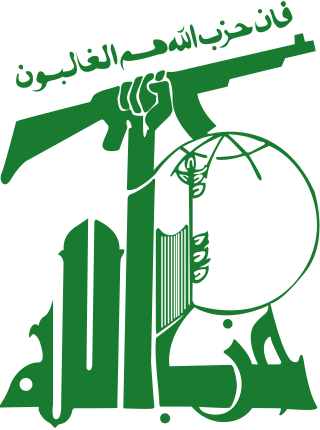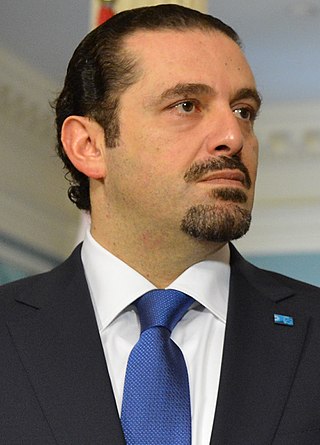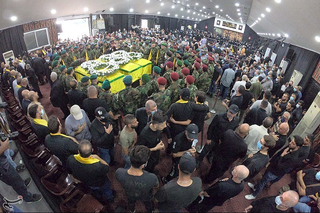
Hezbollah is a Lebanese Shia Islamist militant group and political party. Its paramilitary wing, the Jihad Council, commands the most powerful armed force in Lebanon. It has extensive financial and military backing from Iran and serves as the leading member of its "Axis of Resistance". The group is a key player in the Lebanese political system, and its political wing, the Loyalty to the Resistance Bloc party, holds 15 seats in the Lebanese Parliament. The entire organization, or its military wing alone, has been designated as a terrorist group by several countries, including most Western nations.

Hassan Nasrallah was a Lebanese cleric and politician who served as the secretary-general of Hezbollah, a Shia Islamist political party and militia, from 1992 until his assassination in 2024.
This is a timeline of events related to the 2006 Lebanon War.

The 2006 Lebanon War, also called the 2006 Israel–Hezbollah War and known in Lebanon as the July War and in Israel as the Second Lebanon War, was a 34-day armed conflict in Lebanon, northern Israel and the Golan Heights. The principal parties were Hezbollah paramilitary forces and the Israel Defense Forces (IDF). The conflict started on 12 July 2006, and continued until a United Nations-brokered ceasefire went into effect in the morning on 14 August 2006, though it formally ended on 8 September 2006 when Israel lifted its naval blockade of Lebanon.
Hezbollah has a military branch and is the sponsor of a number of lesser-known groups, some of which may be little more than fronts for Hezbollah itself. These groups include the Organization of the Oppressed, the Revolutionary Justice Organization, the Organization of Right Against Wrong, and Followers of the Prophet Muhammad.
Hezbollah has a Foreign Relations Unit and maintains relations with a number of foreign countries and entities. These are particularly Shia states, but also Sunni groups like those affiliated with the Palestinian cause; and the group is also suggested to have operations outside the Middle East in places such as Latin America and North Korea.

The 2006–2008 Lebanese protests were a series of political protests and sit-ins in Lebanon that began on 1 December 2006, led by groups that opposed the US and Saudi-backed government of Prime Minister Fouad Siniora and ended on 21 May 2008 with the signing of the Doha Agreement. The opposition was made up of Hezbollah, Amal, and the Free Patriotic Movement (FPM); a number of smaller parties were also involved, including the Marada party, the Lebanese Communist Party and the Syrian Social Nationalist Party. A majority of the members of the government were part of the anti-Syrian March 14 Alliance, a coalition of political parties and independents in Lebanon. The two groups were also divided along religious lines, with most Sunnis and Druze supporting the government, and most Shi'a supporting the opposition. The Christian community was split between the two factions, with Michel Aoun, the leader of the FPM, claiming to have more than 70% support among the Christians, based on the results of the 2005 parliamentary election.
The funding of Hezbollah comes from Lebanese business groups, private persons, businessmen, the Lebanese diaspora involved in African diamond exploration, other Islamic groups and countries, and the taxes paid by the Shia Lebanese. Hezbollah says that the main source of its income comes from its own investment portfolios and donations by Muslims.

On 9 November 2009, after five months of negotiations following the 2009 parliamentary elections, Lebanese prime minister Saad Hariri formed a national unity government.

Between 2011 and 2017, fighting from the Syrian civil war spilled over into Lebanon as opponents and supporters of the Syrian Arab Republic traveled to Lebanon to fight and attack each other on Lebanese soil. The Syrian conflict stoked a resurgence of sectarian violence in Lebanon, with many of Lebanon's Sunni Muslims supporting the rebels in Syria, while many of Lebanon's Shi'a Muslims supporting the Ba'athist government of Bashar Al-Assad, whose Alawite minority is usually described as a heterodox offshoot of Shi'ism. Killings, unrest and sectarian kidnappings across Lebanon resulted.

Foreign involvement in the Syrian civil war refers to political, military and operational support to parties involved in the ongoing conflict in Syria that began in March 2011, as well as active foreign involvement. Most parties involved in the war in Syria receive various types of support from foreign countries and entities based outside Syria. The ongoing conflict in Syria is widely described as a series of overlapping proxy wars between the regional and world powers, primarily between the United States and Russia as well as between Iran and Saudi Arabia.

Mustafa Badreddine was a Lebanese militant leader and both the cousin and brother-in-law of Imad Mughniyeh. He was nicknamed Dhu al-Fiqar referring to the legendary sword of Ali. His death was seen as one of the biggest blows in the Hezbollah leadership.

The Iran–Israel proxy conflict, also known as the Iran–Israel proxy war or Iran–Israel Cold War, is an ongoing proxy conflict between Iran and Israel. In the Israeli–Lebanese conflict, Iran has supported Lebanese Shia militias, most notably Hezbollah. In the Israeli–Palestinian conflict, Iran has backed Palestinian groups such as Hamas. Israel has supported Iranian rebels, such as the People's Mujahedin of Iran, conducted airstrikes against Iranian allies in Syria and assassinated Iranian nuclear scientists. In 2018 Israeli forces directly attacked Iranian forces in Syria.
The following lists some remarkable events that happened in 2014 in Lebanon on a monthly basis.
The January 2015 Mazraat Amal incident was an airstrike against a two-car convoy that killed six Hezbollah fighters, including two prominent commanders, and a general of the Iranian Revolutionary Guards (IRGC), Mohammad Ali Allahdadi, at al-Amal Farms in the Quneitra District of Syria, in the Eastern Golan Heights, on 18 January 2015, during the Syrian Civil War. The attack was largely attributed to Israel, which did not officially confirm that it carried it out. Hezbollah and IRGC held Israel responsible and threatened to retaliate. On 19 January 2015, Al-Nusra Front member Abu Azzam al-Idlibi claimed that Jihad Mughniyeh and the other Hezbollah fighters were killed in an Al-Nusra Front ambush at Jaroud in the Qalamoun Mountains in the Al-Qutayfah District northeast of Damascus, claiming that it "will be the end of the Persian project, God willing."
Israel's official position on the Syrian Civil War has been strict neutrality. However, Israel has become involved politically and militarily to prevent the growing influence and entrenchment of Iranian forces and its proxies throughout Syria. Israel's military activity, officially called Operation Chess, has primarily been limited to missile and air strikes targeting Iranian facilities in Syria as well as those of its proxies, especially Hezbollah. These attacks were not officially acknowledged before 2017. Israel has also carried out air strikes in Syria to disrupt weapons shipments to Hezbollah. By August 2022, the UK investigative non-profit Airwars estimated that 17-45 civilians were killed and another 42-101 civilians were wounded by Israeli airstrikes in Syria since 2013. Syrian reports place these figures much lower than other foreign actors in the conflict. Israel has also provided humanitarian aid to victims of the civil war from 2013 to September 2018, an effort that was ramped up after June 2016 with the launch of Operation Good Neighbour.

Hezbollah involvement in the Syrian civil war has been substantial since the beginning of armed insurgency phase of the Syrian civil war in 2011, and evolved into active support for Syrian government forces and troop deployment from 2012 onwards. By 2014, Hezbollah was deployed across Syria. Hezbollah has also been very active in preventing Al-Nusra Front and Islamic State penetration into Lebanon, being one of the most active forces in the Syrian civil war spillover in Lebanon.

The Lebanese liquidity crisis is an ongoing financial crisis affecting Lebanon, that became fully apparent in August 2019, and was further exacerbated by the COVID-19 pandemic in Lebanon, the 2020 Beirut port explosion and the Russian invasion of Ukraine. The country experienced liquidity shortages in the years prior to 2019 but the full extent of the fragility of the economy were concealed through financial engineering by the governor of the central bank. Lebanon's crisis was worsened by sanctions targeting Syria's government and Iran-backed Hezbollah, which intensified under Donald Trump.

The 2021 Beirut clashes, also known as the 2021 Beirut massacre, Tayouneh Incident or Mini May 7, occurred in the Tayouneh neighborhood of the Lebanese capital of Beirut on 14 October 2021 between Hezbollah and the Amal Movement, and unidentified gunmen allegedly associated with the Lebanese Forces, and the Lebanese Armed Forces, resulting in the death of seven people and injury of 32 others, and the arrest of nine by the Lebanese Armed Forces. The violence erupted during a protest organized by Hezbollah and its allies against Tarek Bitar, the lead judge probing the 2020 explosion in the city's port, as they accuse him of being partisan. The clashes took place at the Justice Palace, located in Eastern Beirut along the former civil war front line between the Christian and Muslim Shiite areas. The clashes were the worst in the country since the 2008 Lebanon conflict.

On 27 September 2024, Hassan Nasrallah, the secretary-general of Hezbollah, was assassinated in an Israeli airstrike in Beirut. The strike took place while Hezbollah leaders were meeting at a headquarters located 60 feet (18 m) underground beneath residential buildings in Haret Hreik in the Dahieh suburb to the south of Beirut. Conducted by the Israeli Air Force using F-15I fighters, the operation involved dropping more than 80 bombs, including US-made 2,000-pound (910 kg) bunker buster bombs, destroying the underground headquarters as well as nearby buildings. The Israel Defense Forces (IDF) codenamed the operation "New Order".
















